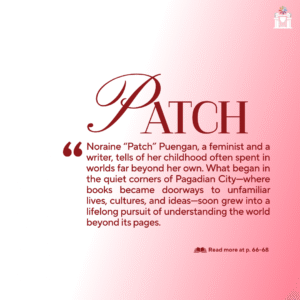

Words by: Alexia Reign Hernandez
Noraine “Patch” Puengan recounts her journey from the discovery of her sexual identity to her calling of being a feminist writer
Noraine “Patch” Puengan, a feminist and a writer, tells of her childhood often spent in worlds far beyond her own. What began in the quiet corners of Pagadian City—where books became doorways to unfamiliar lives, cultures, and ideas—soon grew into a lifelong pursuit of understanding the world beyond its pages.
Patch was expected to follow a more conventional path. Initially drawn to a career in governance, she imagined a future where she would reshape the social landscape, tackling deep-rooted issues with the precision of policy and the compassion of grassroots movements.
In quiet moments of introspection, she often visualized a world shaped by her ideals—one free from external expectations. These moments allowed her to explore possibilities beyond the ordinary. But fate had other plans.
Her first turning point came when she qualified for the National Schools Press Conference, a journalism competition that not only deepened her understanding of writing’s impact but also brought her to Dumaguete.
It is a place that opened her eyes to the possibilities that awaited within the portals of Silliman University (SU).
While exploring through the halls of SU, she came across its array of programs, and in that moment, the idea of pursuing creative writing lingered. Is this the path she had been waiting for? Could this be the avenue through which she could make a difference?
Drawn by the possibility, she took the leap with confidence.
Patch found herself in a university town that was both foreign and liberating. The unfamiliarity of it all heightened her sense of discovery. At first, diving into literary theory felt daunting, but she soon realized that to hone her craft, understanding its roots was essential.
She then dove into her studies and readings, overwhelmed by the dense and unfamiliar language of theory. But as she pressed on, the pages began to speak to her. Her questions and quiet frustrations echoed through her book, until the abstract began to feel personal—too close to home.
It wasn’t just the classroom that shaped Patch’s advocacy but rather the streets, the people, and the moments that inspired her to look at the world differently.
She recalls her first Pride Parade in Dumaguete like a scene from a movie. The vibrant colors, the festive music, and the quiet defiance of joy—all these came together to celebrate freedom and identity. While pondering its purpose, she saw her professor in creative writing performing in a huge crowd. And it wasn’t just an act for her, it was a statement. A bold stand for the rights of those often overlooked—a fight for the underrepresented.
Just as she watched the performance, something stirred within her. “It affirmed my beliefs,” she says. “It pushed me to also join the fight, that it’s okay for you to be loud.”
Compared to her life in Pagadian, where she was taught to keep her head down and blend in, the liberating and defiant spirit of Dumaguete lifted the weight of silence from her shoulders. It made her realize that speaking up wasn’t just encouraged but essential.
For Patch, this meant speaking up through writing, a way to confront systems of oppression and envision a better world, showing her that activism could take many forms beyond protests and rallies.
“That’s my activism. I write stories to comfort the uncomfortable and disrupt the comfortable,” she says.
Her activism, fused with her gift for writing, gave rise to a powerful voice. Essays like “The Female Gaze” and the award-winning “Save Earth, Save Us” earned recognition—not just for their craft, but for the conviction behind them. Each piece marked a step forward in her ongoing pursuit of women’s empowerment and ethical change.
Her work is defined by this balance, weaving critique with possibility to not only deconstruct but also reimagine a better future. Despite feminism becoming mainstream in digital spaces, Patch is quick to point out the glaring gap between online empowerment and real-world struggles.
For Patch, she critiques the idea of ‘girlboss,’ arguing that it gives women a false sense of progress by framing power as the solution to inequality. Instead, she calls for a sharper focus on the systemic barriers that continue to hinder real change. Her criticisms undeniably sparked conversations and debate.
Now pursuing her master’s degree in literary studies at SU, Patch is determined to bridge the gap between theory and practice of feminism. One of her academic endeavors is holding a gender class, an opportunity to mentor young writers and activists—the way she wished she had one growing up.
To those who dream of finding their voice, Patch urges the youth to put in the work and define themselves. When opportunity arises, she believes a blank page should be filled with writings of resistance.
